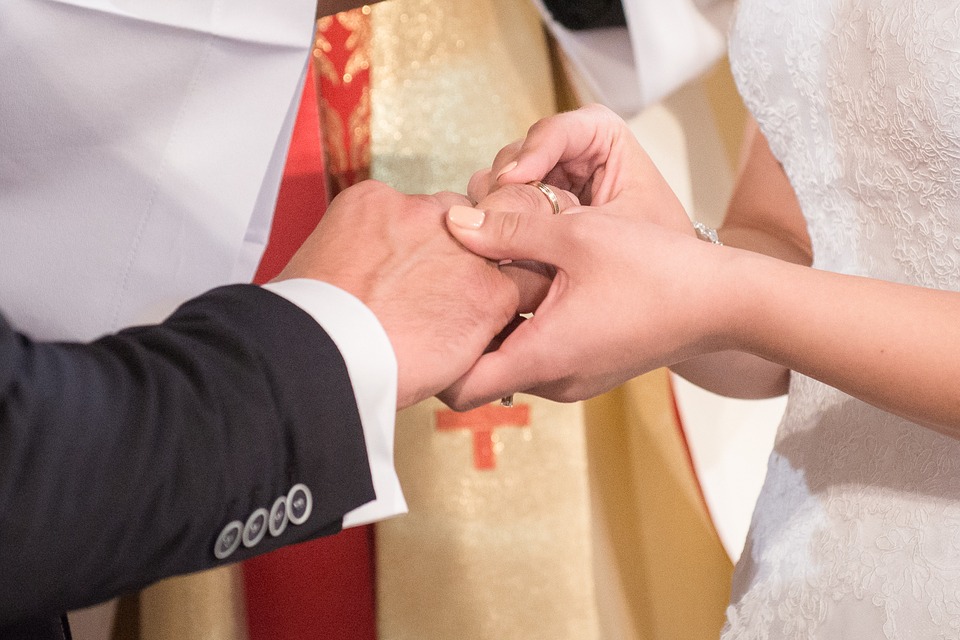Until recent decades, the idea of a Catholic marrying outside the faith was practically unheard of, if not taboo. Such weddings took place in private ceremonies in the parish rectory, not in a church sanctuary in front of hundreds of friends and family.
These days, many people marry across religious lines. The rate of ecumenical marriages (a Catholic marrying a baptized non-Catholic) and interfaith marriages (a Catholic marrying an non-baptized non-Christian) varies by region. In areas of the U.S. with proportionately fewer Catholics, as many as 40% of married Catholics may be in ecumenical or interfaith marriages.
Because of the challenges that arise when a Catholic marries someone of a different religion, the church doesn’t encourage the practice, but it does try to support ecumenical and interfaith couples and help them prepare to meet those challenges with a spirit of holiness. Theologian Robert Hater, author of the 2006 book, “When a Catholic Marries a Non-Catholic,” writes: “To regard mixed religion marriages negatively does them a disservice. They are holy covenants and must be treated as such.”
A marriage can be regarded at two levels – whether it is valid in the eyes of the Church and whether it is a sacrament. Both depend in part on whether the non-Catholic spouse is a baptized Christian or a non-baptized person, such as a Jew, Muslim or atheist.
If the non-Catholic is a baptized Christian (not necessarily Catholic), the marriage is valid as long as the Catholic party obtains official permission from the diocese to enter into the marriage and follows all the stipulations for a Catholic wedding.
A marriage between a Catholic and another Christian is also considered a sacrament. In fact, the church regards all marriages between baptized Christians as sacramental, as long as there are no impediments.
“Their marriage is rooted in the Christian faith through their baptism,” Hater explains.
In cases where a Catholic is marrying someone who is not a baptized Christian – known as a marriage with disparity of cult – “the church exercises more caution,” Hater says. A “dispensation from disparity of cult,” which is a more rigorous form of permission given by the local bishop, is required for the marriage to be valid.
The union between a Catholic and a non-baptized spouse is not considered sacramental. However, Hater adds, “Though they do not participate in the grace of the sacrament of marriage, both partners benefit from God’s love and help [grace] through their good lives and beliefs.”
Marriage Preparation
Good-quality marriage preparation is essential in helping couples work through the questions and challenges that will arise after they tie the knot.
Questions that the engaged couple should consider include in what faith community (or communities) the couple will be involved, how the couple will handle extended family who may have questions or concerns about one spouse’s faith tradition, and how the couple will foster a spirit of unity despite their religious differences
Of all the challenges an ecumenical or interfaith couple will face, the most pressing one likely will be the question of how they raise their children.
“The church makes clear … that their marriages will be more challenging from the perspective of faith,” Hater writes. “… Special challenges exist as well when it comes to raising children in the Catholic faith.”
Because of these challenges, the church requires the Catholic party to be faithful to his or her faith and to “make a sincere promise to do all in his or her power” to have their children baptized and raised in the Catholic faith. This provision of the 1983 Code of Canon Law is a change from the 1917 version, which required an absolute promise to have the children raised Catholic.
Likewise, the non-Catholic spouse is no longer required to promise to take an active role in raising the children in the Catholic faith, but instead “to be informed at an appropriate time of these promises which the Catholic party has to make, so that it is clear that the other party is truly aware of the promise and obligation of the Catholic party,” the code states. (See the 1983 [current] Code of Canon Law, canons 1124-1129 on “Mixed Marriages” for the full text.)
But suppose the non-Catholic party insists that the children will not be raised Catholic? The diocese can still grant permission for the marriage, as long as the Catholic party promises to do all he or she can to fulfill that promise, Hater writes. The marriage may be legal, he notes, but is it a wise choice? Those are questions that may also need to be explored in marriage preparation.
If children are raised in another faith, he notes, “the Catholic parent must show children good example, affirm the core beliefs of both parents’ religious traditions, make them aware of Catholic beliefs and practices and support the children in the faith they practice.”
The Wedding Ceremony
Because Catholics regard marriage as a sacred event, the church prefers that ecumenical interfaith couples marry in a Catholic church, preferably the Catholic party’s parish church. If they wish to marry elsewhere, they must get permission from the local bishop. He can permit them to marry in the non-Catholic spouse’s place of worship or another suitable place with a minister, rabbi or civil magistrate – if they have a good reason, according to the U.S. Conference of Catholic Bishops. This permission is called a “dispensation from canonical form.” Without it, a wedding not held in a Catholic church is not considered valid.
It’s popular, and acceptable, for an ecumenical or interfaith couple to invite the non-Catholic spouse’s minister to be present at the wedding. But it’s important to note that, according to canon law, only the priest may officiate at a Catholic wedding. A minister may offer a few words, but he or she may not officiate or preside at a joint ceremony.
It is generally recommended that ecumenical or interfaith weddings not include Communion. Therefore, most ecumenical or interfaith weddings take place outside of Mass: there is a different service for a Catholic marrying a baptized Christian and a Catholic marrying a non-baptized person or catechuman (person preparing for baptism).
“The reception of Communion is a sign of unity with the ecclesial community,” he explains. “On a wedding day, the fact that one-half of the congregation does not belong to the Catholic community [and, hence, does not receive Communion] cannot be a sign of welcome or unity on a couple’s wedding day.” It might be “likened to inviting guests to a celebration and not allowing them to eat,” he adds.
If an ecumenical couple wants to celebrate their wedding within Mass, they must get permission from the bishop, Hater says. “In addition, only with his permission can a person, other than a Catholic, receive Communion in church during such a wedding.”
Catholic-Jewish Weddings
Jews and Christians share a view of marriage as a holy union and symbol of God’s bond with his people.
Stricter branches of Judaism, such as Orthodox and Conservative, forbid or strongly discourage Jews from marrying non-Jews and prohibit their rabbis from participating in interreligious marriage ceremonies.
“Conservative Judaism sees only the marriage of two Jews as … a sacred event,” reported the USCCB’s Committee for Ecumenical and Interreligious Affairs, which discussed Catholic-Jewish marriages at a conference in November 2004. The Reform branch of Judaism strongly discourages interfaith marriages, but there is no legal prohibition against it as there is in the stricter branches.
Often, a Catholic-Jewish wedding is held at a neutral site – with permission from the bishop – so that neither family will feel uncomfortable. In such cases, a rabbi is likely to officiate. The couple needs to have a dispensation from canonical form for such a wedding to be valid in the Catholic Church.
“Your pastor could be involved in the wedding by giving a blessing, but in Catholic-Jewish weddings, usually the rabbi will officiate,” writes Father Daniel Jordan, judicial vicar for the Tribunal of the Diocese of Burlington, Vt.
As for the children of a Catholic-Jewish marriage, religious leaders agree that it is “vastly preferable for the offspring of mixed marriages to be raised exclusively in one tradition or the other, while maintaining an attitude of respect for the religious traditions of the ‘other’ side of the family,” the conference report said.
Traditionally, Jews consider any child of a Jewish woman to be Jewish. The question of what faith in which to raise children must be an ongoing topic of dialogue between the couple and during marriage preparation. “Attempting to raise a child simultaneously as both Jewish and Catholic … can only lead to violation of the integrity of both religious traditions,” the report said.
Catholic-Muslim Marriages
Marriages between Catholics and Muslims present their own particular challenges.
Islamic men may marry outside of their faith only if their spouse is Christian or Jewish. In fact, the prophet Muhammed had a Christian wife and Jewish wife. A non-Muslim wife is not required to adopt any Muslim laws, and her husband cannot keep her from attending church or synagogue. However, Islamic women are forbidden from marrying non-Muslim men unless the spouse agrees to convert to Islam.
For Catholics and Muslims, one of the most difficult aspects of marriage is the religion of the children. Both faiths insist that the children of such marriages to be part of their own religious faith.
Such issues will continue to be challenges for Catholics marrying outside the faith in this increasingly diverse world, Hater writes. But with positive approaches to preparation and ministry, and a spirit of welcome to both parties, many ecumenical and interfaith marriages can be intimate, holy reflections of God’s love.
“Regarding mixed marriages with hope does not minimize the challenges that they present,” he says, “but recognizes the blessings that they can afford to spouses, children and the faith community.”
RESOURCES:
For Further Reading:




